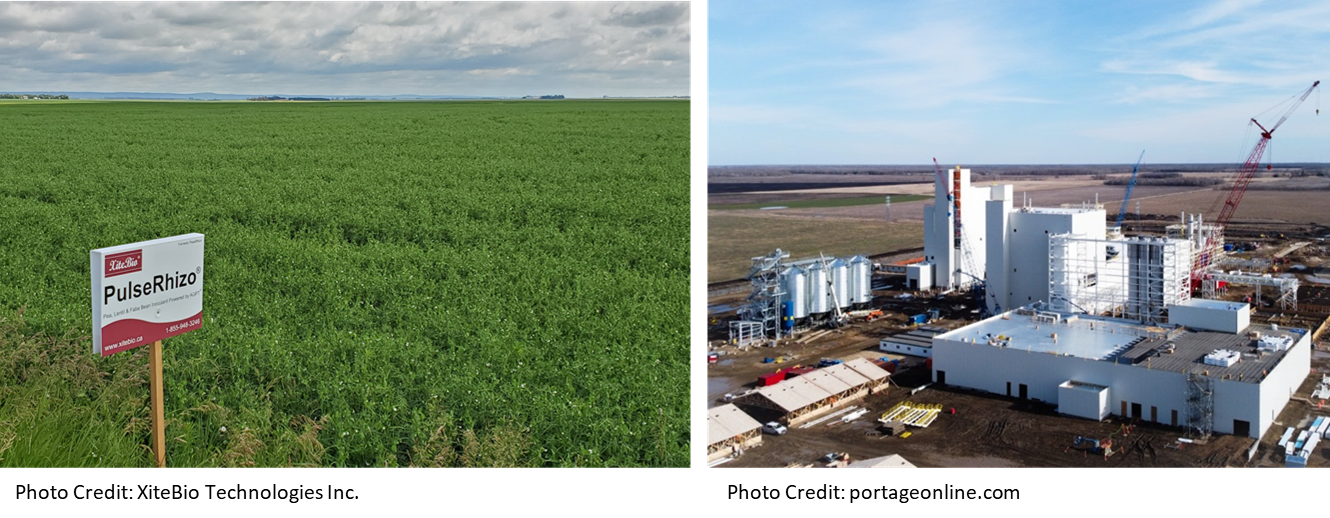Use of plant protein is on the rise across North America. Protein derived from row crops such as soybeans, peas and cereals is showing up more and more in various food products. From protein supplements to veggie burgers, more people are diversifying the ways they obtain protein in their diet, and the plant protein industry is undeniably growing.
So why are so many people increasing their intake of plant protein? The low sodium and fat content of most pulses and cereals makes plant-based protein a healthy choice for getting your protein. This is enticing for many consumers, especially to the rapidly expanding vegan and vegetarian populations around the world. In many South Asian countries, pulses are a primary source of dietary protein and have been a staple food for hundreds of years.
The eco-friendly nature of plant derived protein sources is another benefit. The production of plant protein has a very low environmental impact, producing few greenhouse gasses and having small land use requirements per gram of protein produced (1). This makes it an optimal choice for consumers looking to reduce their carbon footprint.
This uptick in plant protein popularity means increased demand for protein crops from farmers across North America, not only by consumers, but by protein processors as well. Food ingredients manufacturer Roquette is already building a pea protein production facility in Portage la Prairie, Manitoba, to meet the increasing demand for plant proteins in North America. Merit Functional Foods is also planning the construction of a plant protein production facility near Winnipeg, Manitoba, that will produce both pea and canola protein. The construction of production facilities like these show the increasing value of pulse, oilseed and cereal crops across the country, putting farmers in an ideal position to take advantage of this growing market.
As interest in plant protein continues to grow, many farmers will be looking at ways to increase yield and protein content in their crops. There is a wealth of research showing that the use of growth promoting biologicals can increase the protein content of cereal and legume crops such as soybeans (2), field peas (3), wheat (4) and corn (5). Some of these studies also show evidence that using a nitrogen-fixing rhizobial inoculant in tandem with a growth promoting biological on legume crops further increases protein content and plant health. Incorporating liquid inoculants and biologicals with your seed treatments or fertilizer applications or herbicide applications is simple and rarely requires additional equipment or labour. Increasing crop yield and the protein content is a way of greatly increasing the value of your crops without increasing the acres required to grow them. The use of a liquid inoculant, such as XiteBio® SoyRhizo® or XiteBio® PulseRhizo®, in conjunction with a liquid biological such as XiteBio® Yield+, would be an easy addition to most farmers’ crop fertility plans and may increase protein content while improving yields.
References:
2) Mondani, farzad; Khani, Kianoosh; Honarmand, Saeid Jalali; Saeidi, Mohsen. 2019. “Evaluating effects of plant growth-promoting rhizobacteria on the radiation use efficiency and yield of soybean (Glycine max ) under water deficit stress condition” Agricultural Water Management, ISSN: 0378 3774, Vol: 213: 707-713
3) Ranjbar, Sistani N., Kaul, H-P., Desalegn, G., Wienkoop, S. (2017). “Rhizobium Impacts on Seed Productivity, Quality, and Protection of Pisum sativum upon Disease Stress Caused by Didymella pinodes: Phenotypic, Proteomic, and Metabolomic Traits.” Front. Plant Sci. 8:1961. doi: 10.3389/fpls.2017.01961
4) Barneix, A J, M I Saubidet, N Fatta, and M Kade. 2005. “Effect of Rhizobacteria on Growth and Grain Protein in Wheat,” no. October 2005. https://doi.org/10.1051/agro
5) Khati, P., Parul., Bhatt, P., Nisha., Kumar, R., Sharma, A. 2018. “Effect of nanozeolite and plant growth promoting rhizobacteria on maize”. 3Biotech. 8:141. https://doi.org/10.1007/s13205-018-1142-1


